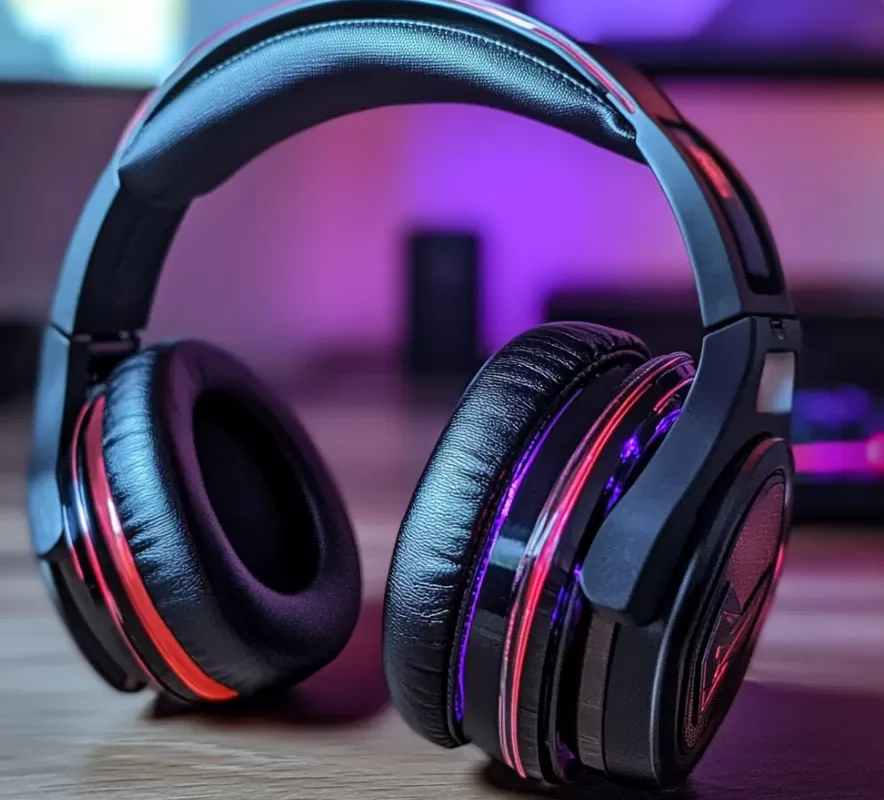In the competitive world of online gaming, every millisecond counts, leading some players to buy dedicated proxies to gain an edge. While most gamers are aware of the importance of frame rates and internet speed, sound latency often remains an overlooked adversary. Sound latency refers to the delay between when an in-game event occurs and when the player hears it through their headphones or speakers. This delay can significantly impact gameplay, leading to missed cues, reduced situational awareness, and ultimately, a disadvantage against opponents.
Sound latency is not just a minor annoyance; it can be the difference between victory and defeat. Imagine hearing an enemy approaching seconds after they’ve already made their move. Such delays can disrupt the flow of the game and affect decision-making processes. Understanding and mitigating sound latency is crucial for gamers who strive for peak performance and an immersive gaming experience.
The Consequences of Sound Latency
Sound latency can manifest in various ways, each affecting the gaming experience differently:
- Delayed Audio Cues: Important sounds like footsteps, gunfire, or environmental effects arrive late, making it challenging to react promptly.
- Desynchronization: Audio and visual elements may fall out of sync, leading to a disjointed and less immersive experience.
- Increased Cognitive Load: Gamers may have to exert extra mental effort to compensate for delayed sounds, leading to fatigue over extended gaming sessions.
Addressing sound latency is essential for maintaining a competitive edge and ensuring that gamers can fully engage with their virtual environments without unnecessary distractions or delays.
Latency Demystified: Understanding the Audio Lag
To effectively reduce sound latency, it’s essential to grasp the underlying factors that contribute to audio lag in online gaming. Latency, in general, refers to the time delay between an action and its corresponding response. When it comes to sound, this delay can stem from several sources, each playing a role in the overall audio experience.
Types of Latency in Gaming
- Input Latency: The delay between a player’s action (e.g., pressing a button) and the game registering that action.
- Network Latency: Often referred to as “ping,” this is the time it takes for data to travel between the player’s device and the game server.
- Audio Processing Latency: The time taken for audio signals to be processed and transmitted from the game to the headphones or speakers.
Understanding these different types of latency helps in pinpointing the exact causes of sound delays and implementing targeted solutions.
Factors Contributing to Audio Lag
Several factors can influence audio latency, including:
- Hardware Quality: The efficiency and speed of audio hardware components, such as sound cards and headphones, play a significant role.
- Software Optimization: The way game audio is handled and processed by software can introduce delays.
- Network Stability: Fluctuations in internet connectivity can exacerbate audio lag, especially in multiplayer environments.
- Wireless Interference: For those using wireless headphones, interference from other devices can contribute to increased latency.
By identifying and addressing these factors, gamers can take proactive steps to minimize audio lag and enhance their overall gaming performance.
Network Matters: The Impact of Internet Connections on Sound Delay
A stable and fast internet connection is the backbone of a seamless online gaming experience. Network performance directly influences not only the visual aspects of gaming but also the audio components. High latency or unstable connections can lead to significant sound delays, disrupting the synchronization between in-game events and their corresponding audio cues.
How Network Quality Affects Audio Latency
The quality of an internet connection affects audio latency in several ways:
- Bandwidth: Sufficient bandwidth ensures that large amounts of data, including high-quality audio streams, are transmitted without bottlenecks.
- Ping Rate: A lower ping rate means quicker data transmission between the player’s device and the game server, reducing delays.
- Packet Loss: When data packets are lost during transmission, audio signals can be delayed or dropped entirely, leading to choppy or incomplete sound.
Optimizing Your Network for Lower Latency
To minimize sound latency caused by network issues, consider the following strategies:
- Use a Wired Connection: Ethernet cables provide a more stable and faster connection compared to Wi-Fi, reducing the chances of latency spikes.
- Close Background Applications: Applications that consume significant bandwidth can interfere with game data transmission. Closing unnecessary programs can free up resources.
- Choose the Right Server: Selecting game servers that are geographically closer can reduce ping rates and improve overall connection stability.
- Upgrade Your Internet Plan: Ensuring you have a high-speed internet plan with low latency can make a substantial difference in reducing audio delays.
By prioritizing network optimization, gamers can create a more reliable environment that supports both high-quality visuals and synchronized audio.
Power Up with Proxies: How Dedicated Proxies Reduce Latency
Dedicated proxies are becoming an increasingly popular solution for gamers looking to minimize latency and enhance their online experience. A dedicated proxy acts as an intermediary between a player’s device and the game server, routing traffic through optimized pathways to reduce delays and improve connection stability.
What Are Dedicated Proxies?
Dedicated proxies are exclusive proxy servers assigned to a single user or a small group, ensuring that the bandwidth and resources are not shared with others. This exclusivity allows for more consistent and reliable performance compared to shared proxies, which can be crowded and slower due to multiple users accessing the same server.
How Dedicated Proxies Reduce Latency
Dedicated proxies can significantly reduce latency through several mechanisms:
- Optimized Routing: By selecting the most efficient pathways for data transmission, dedicated proxies can minimize the distance data travels, thereby reducing the time it takes for information to reach its destination.
- Load Balancing: Distributing network traffic evenly across multiple servers prevents any single server from becoming a bottleneck, ensuring smoother and faster data flow.
- Reduced Packet Loss: Enhanced network management and error correction techniques employed by dedicated proxies can decrease the likelihood of packet loss, ensuring that audio and other data arrive intact and on time.
Benefits of Using Dedicated Proxies for Gamers
Implementing dedicated proxies offers numerous advantages for online gamers:
- Improved Connection Stability: Consistent and reliable connections reduce the chances of sudden latency spikes and disconnections.
- Enhanced Security: Dedicated proxies provide an additional layer of security by masking the player’s IP address, protecting against potential DDoS attacks and other threats.
- Access to Geo-Restricted Servers: Gamers can connect to servers in different regions, potentially accessing games and features that might be unavailable in their locale.
By integrating dedicated proxies into their gaming setup, players can experience a more seamless and responsive gaming environment, with reduced sound latency contributing to a competitive edge.
Making the Right Choice: Selecting Dedicated Proxies for Gamers
Choosing the right dedicated proxy is a critical decision for gamers aiming to reduce sound latency and enhance their overall online experience. Similarly, investing in quality headphone amplifiers can significantly improve audio performance, making in-game sounds clearer and more immersive. Not all proxies or headphone amplifiers are created equal, and selecting the appropriate ones involves understanding your specific gaming needs, the technical specifications of the proxy service and audio equipment, and how these factors align with your gaming setup.
Key Considerations When Choosing Dedicated Proxies
When selecting dedicated proxies for gaming, consider the following factors to ensure optimal performance:
- Speed and Reliability: Look for proxies that offer high-speed connections with minimal downtime. A reliable proxy ensures consistent performance, reducing the chances of latency spikes during crucial gaming moments.
- Server Locations: The geographical location of proxy servers plays a significant role in reducing latency. Choose proxies with servers located near your gaming server to minimize the distance data must travel.
- Bandwidth Allocation: Ensure that the proxy service provides sufficient bandwidth to handle the data demands of your games. Unlimited or high-bandwidth proxies prevent throttling and maintain smooth data flow.
- Security Features: Opt for proxies that offer robust security measures, such as encryption and IP masking, to protect your gaming activities from potential threats and DDoS attacks.
- Customer Support: Reliable customer support is essential for troubleshooting any issues that may arise. Select a proxy provider known for responsive and knowledgeable support teams.
Top Dedicated Proxy Providers for Gamers
Several proxy providers cater specifically to the needs of gamers, offering features that help reduce latency and improve connection stability. Here are some of the top choices:
- ProxyGamer: Known for its extensive server network and high-speed connections, ProxyGamer offers dedicated proxies optimized for gaming performance.
- GameProxyHub: This provider focuses on low-latency proxies with servers strategically located near major gaming hubs, ensuring minimal sound delay.
- LatencyFree Proxies: Offering a combination of speed, security, and excellent customer support, LatencyFree Proxies is a popular choice among competitive gamers.
By carefully evaluating these aspects, gamers can select dedicated proxies that not only reduce sound latency but also enhance their overall gaming performance and security.
Wireless Woes: Do Wireless Headphones Increase Sound Latency?
Wireless headphones offer the convenience of mobility and freedom from tangled cables, but they come with their own set of challenges, particularly concerning sound latency. For online gamers, where every millisecond counts, understanding the impact of wireless technology on audio performance is essential.
The Latency Challenge with Wireless Headphones
Wireless headphones transmit audio signals via Bluetooth or proprietary wireless technologies, which inherently introduce some delay compared to wired connections. This delay, or latency, can disrupt the synchronization between in-game actions and their corresponding sounds, affecting gameplay.
- Bluetooth Latency: Standard Bluetooth connections typically exhibit higher latency, which can lead to noticeable delays in audio transmission. This delay can make it difficult for gamers to react promptly to in-game events.
- Proprietary Wireless Technologies: Some high-end wireless headphones use proprietary technologies designed to reduce latency. While these offer better performance, they may still fall short compared to wired connections in terms of immediacy.
Factors Contributing to Increased Latency in Wireless Headphones
Several elements can exacerbate sound latency in wireless headphones:
- Signal Interference: Wireless signals are susceptible to interference from other devices operating on similar frequencies, such as Wi-Fi routers and other Bluetooth devices, which can increase latency.
- Codec Efficiency: The audio codec used for wireless transmission affects latency. Codecs with higher compression rates may introduce more delay as data takes longer to encode and decode.
- Battery Levels: Lower battery levels can impact the performance of wireless headphones, potentially increasing latency as the device struggles to maintain a stable connection.
Understanding these factors helps gamers make informed decisions about their audio equipment and take steps to mitigate latency issues.
Cutting-Edge Tech: Low-Latency Wireless Headphones for Gamers
Advancements in wireless technology have led to the development of low-latency wireless headphones tailored for gamers. These headphones aim to bridge the gap between the convenience of wireless audio and the need for real-time sound transmission essential for competitive gaming.
Features of Low-Latency Wireless Headphones
Low-latency wireless headphones incorporate several key features to minimize audio delay:
- Advanced Wireless Protocols: Utilizing protocols like 2.4 GHz or proprietary wireless connections that offer faster data transmission compared to standard Bluetooth.
- Low-Latency Codecs: Implementing codecs specifically designed to reduce encoding and decoding times, thereby decreasing overall latency.
- Dedicated Wireless Transmitters: Some models come with dedicated USB dongles that provide a more stable and faster connection to the gaming device, bypassing the limitations of Bluetooth.
Top Low-Latency Wireless Headphones for Gamers
Several models stand out in the market for their low-latency performance and gaming-centric features:
- SteelSeries Arctis Pro Wireless: Known for its dual-wireless system, this headset offers a dedicated wireless transmitter that minimizes latency while providing high-fidelity sound.
- Corsair Virtuoso RGB Wireless: Equipped with a low-latency slipstream wireless technology, it ensures synchronized audio and visual elements for an immersive gaming experience.
- HyperX Cloud Flight S: Features a robust wireless connection with minimal latency, combined with comfortable design and long battery life, making it ideal for extended gaming sessions.
These cutting-edge headphones provide gamers with the flexibility of wireless audio without compromising on the critical aspect of low latency, enhancing both performance and comfort.
The Perfect Combo: Merging Proxies and Wireless Tech for Optimal Performance
Achieving the ultimate gaming experience involves harmonizing various technological components to work seamlessly together. By combining dedicated proxies with low-latency wireless headphones, gamers can significantly reduce sound latency and enhance their overall performance.
Synergizing Dedicated Proxies and Wireless Headphones
When dedicated proxies and wireless headphones are integrated effectively, they complement each other in reducing different aspects of latency:
- Dedicated Proxies: Optimize network pathways, ensuring that data travels quickly and efficiently between the gaming device and server, reducing network-induced latency.
- Low-Latency Wireless Headphones: Minimize the delay in audio transmission from the device to the headphones, ensuring that sound cues are timely and synchronized with in-game actions.
Together, these technologies address both network and hardware-related latency issues, providing a comprehensive solution for lag-free gaming.
Steps to Optimize Both Technologies for Reduced Latency
To maximize the benefits of using dedicated proxies and low-latency wireless headphones, follow these optimization steps:
- Select the Right Proxy Server: Choose a dedicated proxy with servers closest to your gaming server location to minimize network latency.
- Configure Headphone Settings: Ensure your wireless headphones are set to low-latency modes and that any proprietary software is properly configured for optimal performance.
- Maintain a Stable Connection: Use high-quality wireless transmitters and minimize interference by positioning your devices away from other electronic equipment.
- Regularly Update Firmware: Keep both your proxy software and headphone firmware up to date to benefit from the latest performance enhancements and latency reductions.
- Monitor Network Performance: Use network monitoring tools to keep track of your connection’s stability and address any issues that may arise promptly.
By meticulously optimizing both dedicated proxies and wireless headphones, gamers can create a highly responsive and immersive gaming environment, where sound latency is minimized to the greatest extent possible.
Benefits of the Combined Approach
Integrating dedicated proxies with low-latency wireless headphones offers several advantages:
- Enhanced Responsiveness: Reduced network and audio latency ensure that all in-game actions and sound cues are received in real-time, improving reaction times and decision-making.
- Improved Immersion: Synchronized audio and visual elements contribute to a more immersive gaming experience, making players feel more connected to the game world.
- Competitive Edge: Minimizing latency provides a tangible advantage in competitive gaming, where split-second decisions can determine the outcome of matches.
By leveraging the strengths of both dedicated proxies and advanced wireless headphone technology, gamers can achieve a superior level of performance and enjoyment in their online gaming endeavors.
Frequently Asked Questions
While dedicated proxies can significantly reduce network-induced latency by optimizing data routes and improving connection stability, they cannot entirely eliminate sound latency. Other factors, such as the quality of wireless headphones and the efficiency of your gaming hardware, also play crucial roles. However, combining dedicated proxies with low-latency wireless headphones can greatly minimize overall sound latency.
Yes, low-latency wireless headphones are designed to cater to various gaming genres, including fast-paced action games, competitive shooters, and immersive RPGs. Their ability to deliver timely and synchronized audio makes them versatile for different gaming styles, enhancing the overall experience across the board.
While each technology independently contributes to reducing latency, using both dedicated proxies and low-latency wireless headphones provides a more comprehensive solution. Dedicated proxies address network-related delays, while low-latency wireless headphones tackle hardware-induced audio delays. Together, they offer a synergistic approach to minimizing sound latency and optimizing gaming performance.



